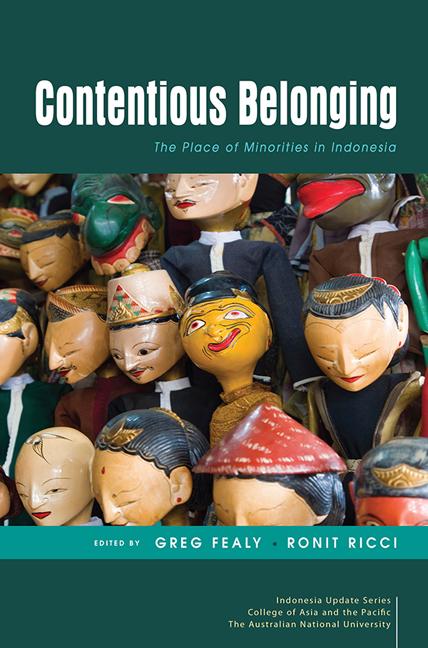Book contents
- Frontmatter
- Contents
- Tables and figures
- Contributors
- Acknowledgments
- Glossary
- Map
- 1 Diversity and its Discontents: an Overview of Minority–Majority Relations in Indonesia
- PART 1 HISTORY AND LAW
- 2 Minorities in Indonesian History: From Ambiguous Advantage to Cantonisation
- 3 Minorities and Discrimination in Indonesia: the Legal Framework
- 4 The Constitutional Court and Minority Rights: Analysing the Recent Homosexual Sex and Indigenous Belief Cases
- PART 2 DISABILITY
- PART 3 SEXUALITY
- PART 4 RELIGION AND ETHNICITY
- PART 5 REFLECTIONS
- Index
- Indonesia Update Series
3 - Minorities and Discrimination in Indonesia: the Legal Framework
from PART 1 - HISTORY AND LAW
Published online by Cambridge University Press: 06 September 2019
- Frontmatter
- Contents
- Tables and figures
- Contributors
- Acknowledgments
- Glossary
- Map
- 1 Diversity and its Discontents: an Overview of Minority–Majority Relations in Indonesia
- PART 1 HISTORY AND LAW
- 2 Minorities in Indonesian History: From Ambiguous Advantage to Cantonisation
- 3 Minorities and Discrimination in Indonesia: the Legal Framework
- 4 The Constitutional Court and Minority Rights: Analysing the Recent Homosexual Sex and Indigenous Belief Cases
- PART 2 DISABILITY
- PART 3 SEXUALITY
- PART 4 RELIGION AND ETHNICITY
- PART 5 REFLECTIONS
- Index
- Indonesia Update Series
Summary
‘They are indeed different, but they are of the same kind, as there is no duality in truth.’
– Mpu TantularThis chapter aims to provide a brief overview of aspects of the complex legal framework regulating the treatment of minorities in Indonesia. It shows that there is, in fact, no coherent framework for the protection of minorities. Instead, a range of laws apply different rules to different groups, sometimes conferring rights, sometimes denying them. Coverage is patchy and some minorities are ignored. Some of these laws are very new, some far too old. Overlap and inconsistency between them is common, and most minorities are left vulnerable to discriminatory treatment and abuse.
In fact, overall, the law regulating minorities reflects an all-too-common pattern of post-Suharto law reform. This began with aspirational, and often impressive, constitutional reform between 1999 and 2002, drawing on international conventions and norms. That was followed by detailed, and often heated, policy debate, usually led by civil society, which produced models for reform. These were often sophisticated, and in many cases were based on global standards. However, the laws and regulations eventually produced by the government or by the national legislature, the People's Representative Council (Dewan Perwakilan Rakyat, DPR), were typically flawed or incomplete. They were often characterised by a lack of compliance measures and sanctions, and the key institutions given responsibility to administer the schemes created by the new laws were frequently weak.
The enforcement of these laws was then made still more problematic by a wicked mix of factors, including poor socialisation by the government of new laws and institutions, which too often left intact widespread ignorance and apathy about the law; covert (sometimes overt) resistance by parts of government and the bureaucracy to the policies that underpinned the new laws; absent, inadequate or fiercely contested budgets; incompetent or uninformed police, prosecutors and judges; and, of course, outright rent-seeking by government officials charged with implementing the new laws, across all levels of central and regional government.
In recent years, a growing culture of intolerant Muslim majoritarianism has created further problems, especially because of the hugely increased influence of the Indonesian Council of Religious Scholars (Majelis Ulama Indonesia, MUI).
- Type
- Chapter
- Information
- Contentious BelongingThe Place of Minorities in Indonesia, pp. 36 - 54Publisher: ISEAS–Yusof Ishak InstitutePrint publication year: 2019



